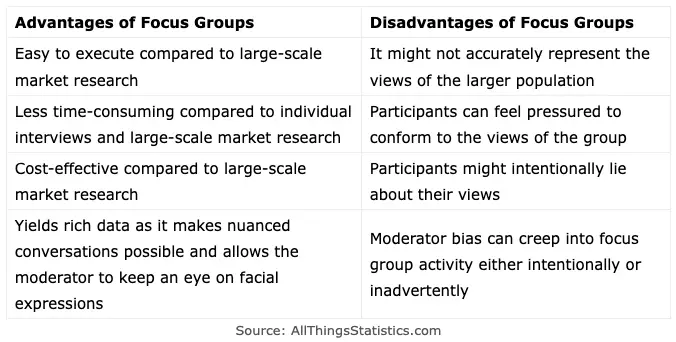Focus Group is a qualitative market research methodology that involves getting together a group of people to discuss specific topics and understand the participants’ views. One example could be a focus group that has been brought together to understand their perception of a brand and the competitive landscape. Inputs from these focus group discussions are used for making changes in the product in the future. Focus Groups are an alternative method to conducting individual interviews and large-scale market research.
Advantages of Focus Groups
Easy to Execute:
Compared to market research surveys where large sets of populations are questioned, the average size of focus groups is relatively smaller. Generally speaking, focus groups might include 5 to 10 people. Since the number of people to be brought together and interviewed in focus groups is smaller, the entire process is easy to execute.
Time-Saving:
One of the most obvious advantages of focus groups is that the time investment is less compared to both conducting large-scale market research and individual interviews.
While conducting large-scale market research, you must conduct surveys with the whole set of people, which takes plenty of time. Similarly, interviewing 5 people would take much more time than questioning them in a focus group.
Cost Effective:
Compared to large-scale market research, focus groups are a cost-effective method of finding valuable information that can be used to modify project plans and products accordingly.
While surveying a large number of people in market research, one has to invest a significant amount of money for the whole process. On the other hand, since focus groups usually involve 5 to 10 people, the monetary investment is much lower.
Rich Data:
Surveys and questionnaires equip researchers with hard data. On the other hand, focus groups make it possible to have nuanced conversations with participants, leading to more actionable insights. If a focus group moderator has questions regarding the feedback provided by participants, they can even ask for the same right there and then, leading to a deeper understanding of how to solve the problem.
Apart from this, moderators can also keep an eye on the facial expressions of focus group participants and make a note of their reactions in a way no survey or questionnaire might allow.
Disadvantages of Focus Groups:
Skewed Results: It can be dangerous to assume that the results of the focus group activity accurately represent the view of the entire target market. Focus groups, after all, are a small subset of a large group, so it is challenging to ensure they represent the larger population. To avoid falling into the trap of skewed results due to the focus group not representing the actual audience, one should use the results for supplementary research rather than accepting them as a fact.
Groupthink: Groupthink is a phenomenon where people feel pressured to conform to the opinion of the group even if they do not agree with the group’s collective opinion. Groupthink can impact the results of a focus group study, especially in a setting where 4 out of 5 people hold a certain view and one person holds a different view. In such a case, the lone person who disagrees with the group might unintentionally conform to the view of the group.
Dishonest Responses:
Dishonest responses are a type of conscious decision made by participants. In some cases, due to a personal opinion, participants might want the result of the focus group to skew towards a particular side and might give dishonest responses despite feeling the exact opposite of what they communicate with the moderator.
Moderator Bias: Since it is the moderator who runs the show of the focus group, there is an extremely high chance that the bias of moderator can creep into the results of the activity.
Moderator Bias can either be intentional or inadvertent. If a moderator has a strong opinion on a subject he is not open to changing his mind, he might design the line of questioning in the focus group to lean towards his own conclusions. Moderators can also inadvertently impact the response of the focus group participants if they harbour a fear of going against the perceived opinion of the moderator. Some participants might also not disclose their true opinions because they fear disappointing the moderator.
To ensure moderator bias does not creep into the study results, moderators should have an open mind about the conclusion and ensure participants feel safe in expressing their opinions.
| Advantages of Focus Groups | Disadvantages of Focus Groups |
| Easy to execute compared to large-scale market research | It might not accurately represent the views of the larger population |
| Less time-consuming compared to individual interviews and large-scale market research | Participants can feel pressured to conform to the views of the group |
| Cost-effective compared to large-scale market research | Participants might intentionally lie about their views |
| Yields rich data as it makes nuanced conversations possible and allows the moderator to keep an eye on facial expressions | Moderator bias can creep into focus group activity either intentionally or inadvertently |
